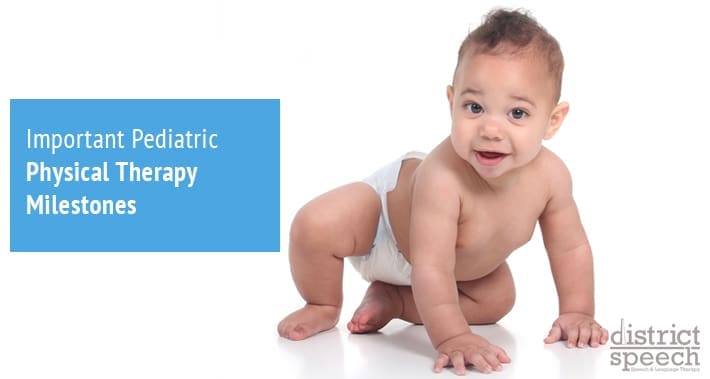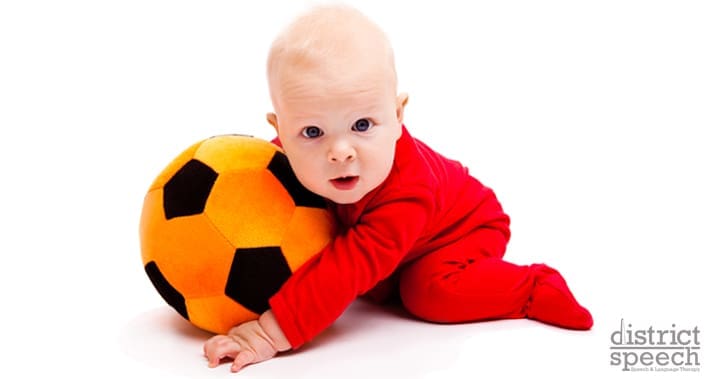
As a parent, you want the best for your child.
This includes ensuring they are developing at an appropriate rate for their age, and they are reaching important developmental milestones at a rate comparable to their peers.
We’re District Speech and Language Therapy, and we offer pediatric physical therapy in Washington DC.
This includes assessments of whether your child is meeting these developmental milestones, and providing you with a treatment plan for your child if they appear to be falling behind.
Today we’re going to have a look at some physical therapy milestones for children, and what happens when they’re not reached.
What Is A Pediatric Physical Therapy Milestone?
Each child is unique, so each child will develop at their own pace.
However, it’s generally accepted among healthcare professionals that there are certain developmental milestones they should be meeting by certain ages.
These include a wide variety of different skills and abilities as they gain control over their body and what it can do.
Physical therapy milestones are generally related to gross motor skills such as crawling, sitting up, and walking without assistance.
Other examples of pediatric milestones include speech related ones, as well as ones related to fine motor skills.
While your child is learning to walk as one of their milestones you can create a safe space by baby proofing your home.
Pediatric Physical Therapy Milestones
In this section, we will look at when certain common milestones should be reached, and by which age.
Each stage may involve using different resources to help the child reach this milestone.
Keep reading to learn more.
6 Months Old
By 6 months of age, your baby should be able to:
- Sit up with support, and eventually sit independently
- Roll from front to back, and also back to front
If these milestones are not reached, it could result in:
- The delayed ability for independent play
- Poor muscle development, especially related to gross motor skills
12 Months Old
By one year of age, your baby should be:
- Imitating an adult while rolling a ball
- Crawling on their belly
- Sitting up without help
- Moving forward on their hands and knees
- Moving into different positions, including sitting, all fours, and lying on their stomach
- Walking using furniture for support
- Taking a couple of steps without help or support
- Rolling a ball (mimicking caregivers or older children)
Failure to reach these developmental goals may indicate:
- Delay of play skills
- Delayed development of muscles
- Poor sensory development, as a result of being unable to interact with toys and other objects
- Difficulty with learning to walk
18 Months Old
Between 12 and 18 months, some milestones your child should be reaching include:
- Sitting up, crawling, and walking
- Walking, though they’ll still use a broad based gait for extra support and balance
- Pushing (but not kicking) a ball
If these achievements are not met, it could lead to:
- Poor muscle development
- Trouble interacting with the environment
- Delayed skills related to play

2 Years Old
By the time your child reaches two years of age, they should be able to:
- Walk and turn corners
- Run
- Carry or pull a toy while walking
- Climb onto furniture, without help from a caregiver
- Walk on steps
- Move to pick up toys without falling
- gross motor skills
If these markers are not met, it could indicate:
- A lack of muscle development, especially muscles needed for running and jumping, and writing
- Limited ability for social interaction
- Inability to interact with the environment and play independently
3 Years Old
Once a child is 3 years of age, they should be able to perform these actions:
- Stand on one foot, by imitating someone else
- Imitate simple arm movements
- Climb a ladder or jungle gym
- Pedal a tricycle
- Walk on stairs, going up or down
- Jump up and down
- Walk on their tip toes
The inability to do these things may result in:
- Difficulty with social skills development
- Decreased development of bodily awareness
- Trouble using playground equipment
- Lowered confidence
- Trouble interacting with other children, especially in environments which call for active play
Failing to obtain these milestones is known as developmental delay.
You as a parent can help your child to reach their developmental milestones using these positive parenting tips or these gift ideas .
What If My Child Isn’t Meeting These Milestones?
Every child develops at different rates, of course.
These milestones aren’t meant to be precise.
Some children will naturally develop their gross motor skills more quickly than others, especially if they tend to be more naturally athletically inclined.
The same is true with learning to read.
Some children will just take to reading more quickly than others.
Reading to your child can help, but some kids are just more bookish than others.
That’s true even if we account for things like dyslexia.
However, some parents read these milestones and, noticing their child is a bit behind, worry they may need autism screening or have a developmental disability.
But don’t worry.
If your child is a week or two behind schedule, it’s not generally cause for concern.
That’s especially the case if they’re still making noticeable improvements toward their milestones.
Likewise, if your child is a couple weeks ahead of schedule, it doesn’t necessarily mean they’re some sort of child prodigy super genius.
However, if your child is falling more than a couple of weeks behind, it’s a good idea to speak with a pediatric physical therapist.
That’s true too if you notice your child isn’t making any progress at all in a given area.
For example, we know that a child should be able to pull themselves up to a standing position by about 12 months.
If you notice they’re trying but struggling a little bit, it doesn’t hurt to give it some time.
On the other hand, if a milestone has come and gone and they show little progress, it could be a sign of a greater issue.
There are a variety of different underlying conditions that might lead to physical therapy developmental delays.
These may include congenital conditions like being born prematurely, Down syndrome, cerebral palsy.
They may also include ADHD, autism spectrum disorder, or sensory processing issues.
RELATED: How Can Speech Therapy And Physical Therapy Help With Autism Spectrum Disorder?
Or, it could just be that your child needs a little extra support.
At that point, it’s a good idea to…
Book Your Appointment With District Speech Today
At District Speech we have pediatric physical therapists on staff who can help assess how your child is doing at reaching developmental milestones.
If you are noticing your little one isn’t developing at a rate appropriate to their age, we can help.
Your pediatric physical therapist can do an assessment and help develop a treatment plan to get your child back on track.
Book your appointment with District Speech today.
1300 I St NW, Suite 400 E,
Washington, DC 20005
- https://g.page/districtspeech
District Speech and Language Therapy specializes in speech therapy, physical therapy, and occupational therapy solutions, for both children and adults, in the Washington D.C and the Arlington Virginia areas.